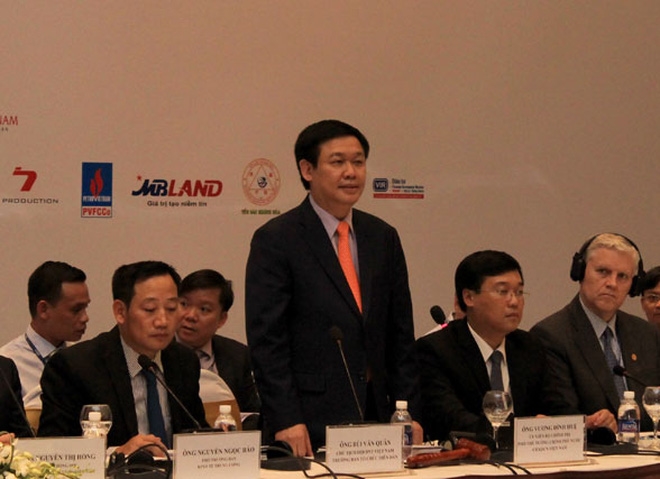 Economy
Economy

The Government aims to have one million businesses by 2020, up from the current 500,000, and will offer assistance in the early stage of startups, Deputy Prime Minister Vương Đình Huệ said at an international seminar held in HCM City yesterday.
 |
| Deputy Prime Minister Vương Đình Huệ delivers speech at an international seminar held in HCM City yesterday. — Photo bizlive.vn |
HCM CITY – The Government aims to have one million businesses by 2020, up from the current 500,000, and will offer assistance in the early stage of startups, Deputy Prime Minister Vương Đình Huệ said at an international seminar held in HCM City yesterday.
“I heard that building a stock exchange for startups would take up to five years, but I want to do that in two to three years, if possible,” he said.
Huệ said that HCM City could be a pioneer in helping the Government attract private funds for investment and building a framework to develop a stock exchange dedicated to startups.
More than 250 delegates, including Government officials, policymakers, representatives of local and foreign financial organisations, and economic experts gathered at the seminar in HCM City to discuss capital markets for startups.
Startups have developed strongly amid the young generation in the country, said Vũ Viết Ngoạn, chairman of the National Financial Supervisory Commission.
Startup companies with innovative and groundbreaking technologies are an important factor contributing to the transformation of the country’s economic growth, he said.
The Government has introduced new initiatives to support a startup ecosystem in Việt Nam, which would create a legal framework for startups to realize innovative ideas, he said.
In countries that are considered startup nations, such as Israel, the US, Japan, South Korea, Singapore and others, there is always a good ecosystem for startups, he said.
Huệ said that international experience shows that a good start-up ecosystem must consist of four factors: a favourable legal framework, innovative startups, active participation of investors and investment funds, and conditions and institutions to support startup activities.
"Việt Nam is in the early stages of establishing a startup ecosystem, and the biggest challenge is fundraising in the incubation as well as the acceleration period," he said.
Thạch Lê Anh, CEO of Việt Nam Silicon Valley project initiated by the Ministry of Science and Technology, said that traditional capital raising channels were relatives and family, venture capital funds, banks, stock exchanges and State and non-governmental funds.
But with banks banned from losing depositors’ savings, startups, which involve risks, found it more difficult to get bank loans, especially in the seed funding stage, she said.
Non-traditional channels to raise capital such as the Angle Investor and Business Accelerator are popular in some countries but not well-developed in Việt Nam.
In general, Việt Nam lacks seed-fund investors who typically make investments ranging from US$10,000 to $500,000, while most startups in Việt Nam are still at this stage.
At the conference, international experts exchanged ideas on developing capital markets for startups.
For instance, Jeong Eun Bo, vice chairman of the Financial Services Commission of Korea, said that to develop a capital market for startups, the Korean Government began crowdfunding and launched both venture capital funds and a stock exchange dedicated to startups called KONEX in 2013.
After crowdfunding was introduced last January in South Korea, 43 startup companies raised $5.7 million through eight online intermediaries approved by Financial Services Commission, said Taehyun NOH, director general of the KONEX Market.
Delegates said the Korean government’s co-investment in private venture capital funds and tax exemptions on selling shares had encouraged mergers and acquisitions. This helped create liquidity for investors and venture capital funds.
According to Anh in all countries with a developed startup ecosystem, governments participate both as policymakers and fund investors.
If Việt Nam wants to focus on developing startups as an economic leverage, the Government must begin direct investment to stimulate growth in numbers and quality, especially in the early stages. This will encourage the private sector to follow suit.
Setting up a trading platform exclusively for startups will open up more funding opportunities, link buyers and sellers, and create a channel for investors to withdraw their investments, especially small angel investors. — VNS




